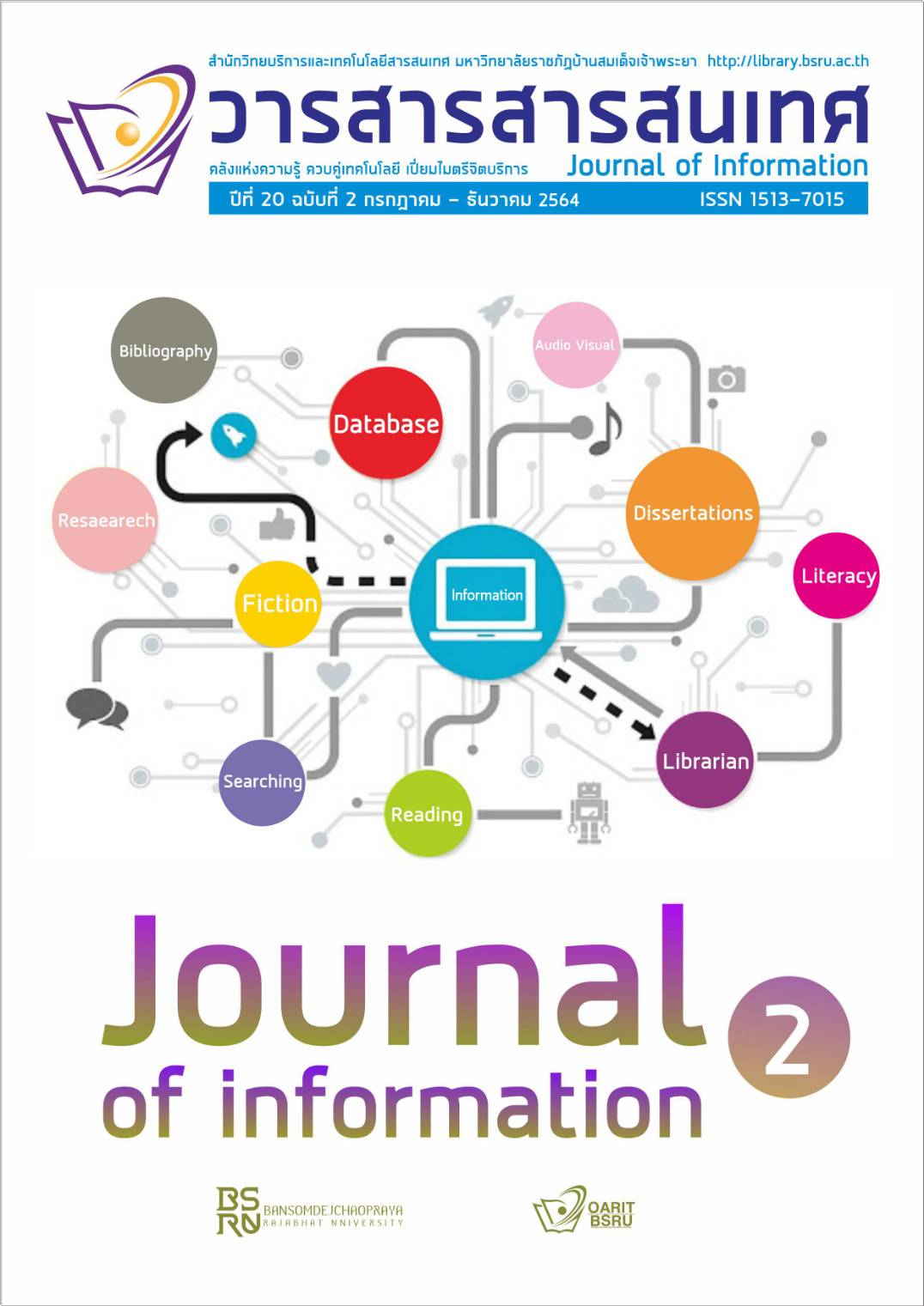The Curriculum Assessment of Information Science and Knowledge Innovation Program (Revised 2022) Faculty of Humanities and Social Science Nakhon Ratchasima Rajabhat University
Keywords:
Course Assessment, Course Design Guidelines, Information and Library ScienceAbstract
This research aimed to 1) evaluate the Bachelor of Arts program in Information and Library Science 2017 revised edition 2) study the expectations of enterprises towards the course design in Information Science and Knowledge Innovation 2022 revised edition, Faculty of Humanities and Social Sciences, Nakhon Ratchasima Rajabhat University.
It is a mixed method research which uses quantitative research using the CIPP model. The target group is students of information and library science, graduates, professors, and graduate users, totaling 103 people. The results showed that 1) Context as a whole group of professors with the highest average opinions in all aspects (= 4.33) 2) As for the overall inputs, the graduates had the most average opinions in all aspects (= 4.40) 3) Overall process aspect group of professors with the highest average opinion in all aspects (= 4.60) and 4) the overall productivity aspect by the professors with the highest average of all opinions ( = 4.40).
For the qualitative research, interviews were conducted with five learning establishments. It was found that the curriculum design was consistent with the workplace context. But should have qualifications according to basic professional knowledge (Hard Skill) and be able to work with others smoothly (Soft Skill) as well. Most of the courses are well covered. and is appropriate can be applied to the operation of an establishment that is a real learning resource. There are suitable job titles and support for graduates in this field. There are suitable job titles and support for graduates in this field both specialized professional positions and professional support positions. There should be competence in knowledge, skills, behavior, and attitudes that are suitable for the establishment.
References
ชาย โพธิสิตา. (2554). ศาสตร์และศิลป์แห่งการวิจัยเชิงคุณภาพ (พิมพ์ครั้งที่ 6). อมรินทร์พริ้นติ้ง.
ผ่องพรรณ ตรัยมงคลกูล และสุภาพ ฉัตราภรณ์. (2555). การออกแบบการวิจัย (พิมพ์ครั้งที่ 7). มหาวิทยาลัยเกษตรศาสตร์.
มหาวิทยาลัยราชภัฏนครราชสีมา, กองนโยบายและแผน. (2563). ยุทธศาสตร์มหาวิทยาลัย
ราชภัฏนครราชสีมา (พ.ศ. 2562-2565) ฉบับปรับปรุงเดือนสิงหาคม 2563. สืบค้น ,
กันยายน 2563. https://www.plannrru.org/wp
content/uploads/2020/09/y18sem63.pdf
มหาวิทยาลัยราชภัฏนครราชสีมา, สำนักส่งเสริมวิชาการและงานทะเบียน. (2564, 26 มีนาคม). ภาพความสำเร็จ
ของการปรับปรุงหลักสูตร. ใน การอบรม การออกแบบหลักสูตรตามแนวทางการจัดการศึกษาที่เน้น ผลลัพธ์การเรียนรู้สู่สมรรถนะ (Outcome-Based Education). มหาวิทยาลัยราชภัฏนครราชสีมา
วิลาวัณย์ พรพัชรพงศ์. (2560). การศึกษาความต้องการบัณฑิตสารสนเทศศาสตร์ในศตวรรษที่ 21.
ว.มนุษยศาสตร์และสังคมศาสตร์ มหาวิทยาลัยมหาสารคาม.36(5), 151-161.
ศรีหทัย เวลล์ส. (2563). ความพึงพอใจของผู้ใช้บัณฑิตที่มีต่อสมรรถนะของบัณฑิตสาขาวิชา
สารสนเทศศึกษา มหาวิทยาลัยบูรพาที่สำเร็จการศึกษาในปีการศึกษา 2557-2560.
ว.วิชาการมนุษยศาสตร์และสังคมศาสตร์ มหาวิทยาลัยบูรพา.28(2), 212-240.
สายสุดา ปั้นตระกูล บุญญลักษม์ ตำนานจิตร และบรรพต พิจิตรกำเนิด. (2562). การประเมินหลักสูตร
บรรณารักษศาสตร์และสารสนเทศศาสตร์เพื่อพัฒนาทักษะที่จำเป็นสำหรับบรรณารักษ์ใน
ศตวรรษที่ 21. ว.ปัญญาภิวัฒน์.11(1), 221-233.
สำนักงานที่ประชุมอธิการบดีมหาวิทยาลัยราชภัฏ. (2562). ยุทธศาสตร์ใหม่มหาวิทยาลัยราชภัฏ
เพื่อการพัฒนาท้องถิ่นระยะ 20 ปี (พ.ศ.2560 - 2579) ฉบับปรับปรุง 11 ตุลาคม 2561.
สืบค้น 11 ตุลาคม 2565. https://www.aru.ac.th/rdi/images/pdf/Plan-rdi1_1.pdf
สำนักงานสภาพัฒนาการเศรษฐกิจและสังคมแห่งชาติ. (2564). (ร่าง) แผนพัฒนาเศรษฐกิจและสังคม
แห่งชาติ ฉบับที่ 13. สืบค้น 11 ตุลาคม 2565. https://www.nesdc.go.th/
download/document/Yearend/2021/plan13.pdf
Aziz, S., Mahmood, M. & Rehman, Z. (2018). Implementation of CIPP model for quality
evaluation at school level: A case study. Journal of Education and Educational
Development.5(1), 189-206. https://files.eric.ed.gov/fulltext/EJ1180614.pdf
The International Federation of Library Associations and Institutions. (2021, February 3). IFLA
Guidelines for Professional Library and Information Science (LIS) Education Programmes.
https://lisedu.files.wordpress.com/2021/02/lisepguidelines-consult-draft.pdf
Stufflebeam, D. L. (2003). The CIPP model for evaluation. In Stufflebeam, D. L. & Kellaghan,
T. (Eds.), The International Handbook of Educational Evaluation (Chapter2) (pp.24-39).
Kluwer Academic Publishers.
Downloads
Published
How to Cite
Issue
Section
License

This work is licensed under a Creative Commons Attribution-NonCommercial-NoDerivatives 4.0 International License.
บทความ ข้อความ ภาพประกอบ และตารางประกอบที่ลงพิมพ์ในวารสารเป็นความคิดเห็นส่วนตัวของผู้นิพนธ์ กองบรรณาธิการไม่จำเป็นต้องเห็นตามเสมอไป และไม่มีส่วนรับผิดชอบใดๆ ถือเป็นความรับผิดชอบของผู้นิพนธ์เพียงผู้เดียว






